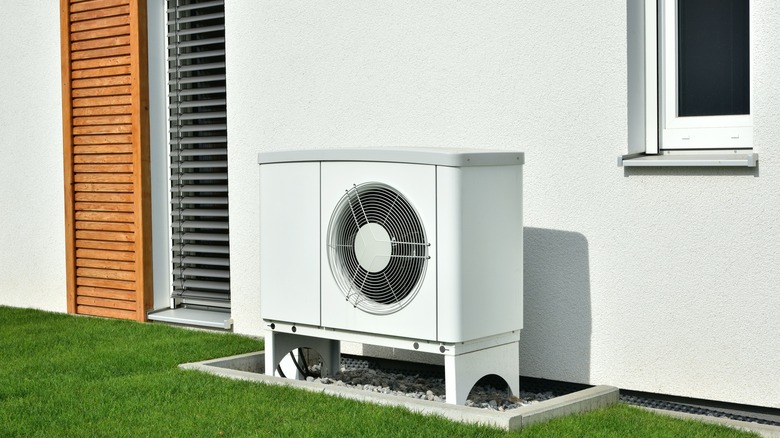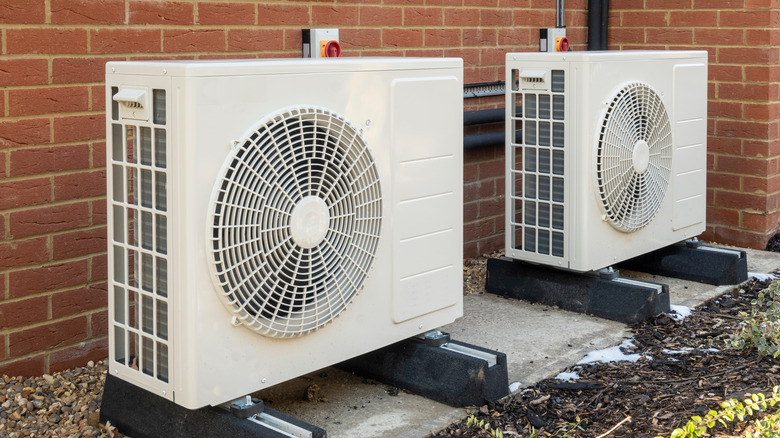How Long Should Your Air Conditioner Last?
Air conditioners are a fundamental part of modern homes. According to the Energy Institute at HAAS, almost 90% of American homes include some kind of air conditioning system. This is a staggering rate considering that in other parts of the world, air conditioning isn't a standard feature. The Washington Post notes that less than 5% of European homes (across the entire continent) make use of air conditioning. Historically, there hasn't been a need for central AC systems because temperatures remained notably lower even in the warmer months. Simply opening windows has been the go-to tool for regulating heat in the house for centuries in this part of the world.
Even still, American homeowners and those living elsewhere have seen an increased requirement to cool down the interior space of their property in recent years as climate change has pushed temperatures increasingly higher and is making traditional cooling methods obsolete (via NASA). As a result of these changes, air conditioning systems have become even more essential to the comfort and day-to-day functionality of the home. With such a reliance on air conditioning units, it's only natural that homeowners might begin to feel a sense of dread as their air conditioner begins to age or the unthinkable happens and the unit begins to rattle or produce jarring noises.
The standard lifespan is 15 to 20 years
Every air conditioning unit will come with its own functional lifespan. There's no single answer to this question; however, the typical unit will last between 15 and 20 years before requiring a replacement, according to Carrier. Air conditioners are durable pieces of machinery, and this length of time is fairly impressive considering that they sit outside and are exposed to the elements at all times.
It's important to note that the selection process when choosing a new air conditioning unit is critical to gaining the maximum timeline of use. Carrier reports that your rate of use and the type of air conditioning unit that you select combine to dictate a general timeline of utilization that you can expect from your unit. Air conditioners have a hard job, and this can be made even more demanding by selecting an air conditioner that isn't big enough to cool down your home efficiently. Making the air conditioner work overtime is a surefire way to reduce both its effectiveness in the short term and the length of time it will provide cooled air to your home over a longer timeline as well.
Maintenance and luck play integral roles in this lifespan
In order to achieve this lengthy timeline of use, you'll need to rely on a blend of luck and critical maintenance. For one thing, natural disasters in your area can damage or destroy your air conditioning unit and many other features of the property. There's no getting around bad luck when it comes to the lifespan of your roof, air conditioning system, windows, and many other features of the home. Fortunately, severe storms and other natural hazards that occur throughout the United States are rare, and multiple property-threatening events happening in your particular geography are unlikely. However, you can't rely on smooth sailing forever, and planning for inclement weather is an important step for any homeowner, regardless of location.
On the other hand, proper care is another feature of a long lifespan. Romeo Air notes that homeowners should schedule routine maintenance on their AC unit every year — and, often, annual maintenance is conducted in the spring to prepare for summer usage increases. Routine checkups on the air conditioner that sits outside and the ductwork and remaining HVAC equipment in your attic and throughout the home will give you the ability to catch minor problems before they become major issues. Debris often builds up on the fan blades of your air conditioner, for instance. If you don't clear this away regularly, it can reduce the effectiveness of the fan and lead to damage inside the unit.


